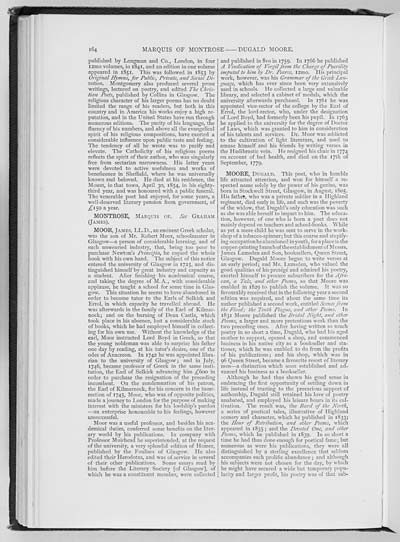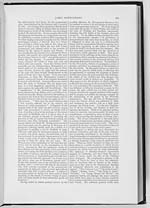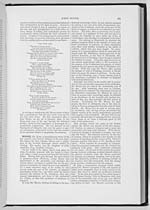Volume 3 > Half-Volume 5
(177) Page 164 - Moor, James
Download files
Individual page:
Thumbnail gallery: Grid view | List view

164 published by Longman and Co., London, in four 12mo volumes, in 1841, and an edition in one volume appeared in 1851. This was followed in 1853 by Original Hymns, for Public, Private, and Social De- votion. Montgomery also produced several prose writings, lectured on poetry, and edited The Chris- tian Poets, published by Collins in Glasgow. The religious character of his larger poems has no doubt limited the range of his readers, but both in this country and in America his works enjoy a high re- putation, and in the United States have ran through numerous editions. The purity of his language, the fluency of his numbers, and above all the evangelical spirit of his religious compositions, have exerted a considerable influence upon public taste and feeling. The tendency of all he wrote was to purify and elevate. The Catholicity of his religious poems reflects the spirit of their author, who was singularly free from sectarian narrowness. His latter years were devoted to active usefulness and works of beneficence in Sheffield, where he was universally known and beloved. He died at his residence, the Mount, in that town, April 30, 1854, in his eighty- third year, and was honoured with a public funeral. The venerable poet had enjoyed, for some years, a well-deserved literary pension from government, of �150 a year. MONTROSE, MARQUIS OF. See GRAHAM (JAMES). MOOR, JAMES, LL.D., an eminent Greek scholar, was the son of Mr. Robert Moor, schoolmaster in Glasgow�a person of considerable learning, and of such unwearied industry, that, being too poor to purchase Newton's Principia, he copied the whole book with his own hand. The subject of this notice entered the university of Glasgow in 1725, and dis- tinguished himself by great industry and capacity as a student. After finishing his academical course, and taking the degree of M.A., with considerable applause, he taught a school for some time in Glas- gow. This situation he seems to have abandoned in order to become tutor to the Earls of Selkirk and Errol, in which capacity he travelled abroad. He was afterwards in the family of the Earl of Kilmar- nock; and on the burning of Dean Castle, which took place in his absence, lost a considerable stock of books, which he had employed himself in collect- ing for his own use. Without the knowledge of the earl, Moor instructed Lord Boyd in Greek, so that the young nobleman was able to surprise his father one day by reading, at his tutor's desire, one of the odes of Anacreon. In 1742 he was appointed libra- rian to the university of Glasgow; and in July, 1746, became professor of Greek in the same insti- tution, the Earl of Selkirk advancing him �600 in order to purchase the resignation of the preceding incumbent. On the condemnation of his patron, the Earl of Kilmarnock, for his concern in the insur- rection of 1745, Moor, who was of opposite politics, made a journey to London for the purpose of making interest with the ministers for his lordship's pardon �an enterprise honourable to his feelings, however unsuccessful. Moor was a useful professor, and besides his aca- demical duties, conferred some benefits on the liter- ary world by his publications. In company with Professor Muirhead he superintended, at the request of the university, a very splendid edition of Homer, published by the Foulises of Glasgow. He also edited their Herodotus, and was of. service in several of their other publications. Some essays read by him before the Literary Society [of Glasgow], of which he was a constituent member, were collected and published in 8vo in 1759. In 1766 he published A Vindication of Virgil from the Charge of Puerility imputed to him by Dr. Pearce, 12mo. His principal work, however, was his Grammar of the Greek Lan- guage, which has ever since been very extensively used in schools. He collected a large and valuable library, and selected a cabinet of medals, which the university afterwards purchased. In 1761 he was appointed vice-rector of the college by the Earl of Errol, the lord-rector, who, under the designation of Lord Boyd, had formerly been his pupil. In 1763 he applied to the university for the degree of Doctor of Laws, which was granted to him in consideration of his talents and services. Dr. Moor was addicted to the cultivation of light literature, and used to amuse himself and his friends by writing verses in the Hudibrastic vein. He resigned his chair in 1774 on account of bad health, and died on the 17th of September, 1779. MOORE, DUGALD. This poet, who in humble life attracted attention, and won for himself a re- spected name solely by the power of his genius, was born in Stockwell Street, Glasgow, in August, 1805. His father, who was a private soldier in a Highland regiment, died early in life, and such was the poverty of the widow, that Dugald's only education was such as she was able herself to impart to him. The educa- tion, however, of one who is born a poet does not mainly depend on teachers and school-books. While as yet a mere child he was sent to serve in the work- shop of a tobacco-spinner; but this coarse and stupify- ing occupation he abandoned in youth, for a place in the copper-printing branch of the establishment of Messrs. James Lumsden and Son, booksellers, Queen Street, Glasgow. Dugald Moore began to write verses at an early period; and Mr. Lumsden, who valued the good qualities of his protege and admired his poetry, exerted himself to procure subscribers for the Afri- can, a Tale, and other Poems, so that Moore was enabled in 1829 to publish the volume. It was so favourably received that in the following year a second edition was required, and about the same time its author published a second work, entitled Scenes from the Flood; the Tenth Plague, and other Poems. In 1831 Moore published the Bridal Night, and other Poems, a larger and more pretentious work than the two preceding ones. After having written so much poetry in so short a time, Dugald, who had his aged mother to support, opened a shop, and commenced business in his native city as a bookseller and sta- tioner, which he was enabled to do from the profits of his publications; and his shop, which was in 96 Queen Street, became a favourite resort of literary men�a distinction which soon established and ad- vanced his business as a bookseller. Although he had thus shown his good sense in embracing the first opportunity of settling down in life instead of trusting to the precarious support of authorship, Dugald still retained his love of poetry unabated, and employed his leisure hours in its cul- tivation. The result was, the Bard of the North, a series of poetical tales, illustrative of Highland scenery and character, which he published in 1833; the Hour of Retribution, and other Poems, which appeared in 1835; and the Devoted One, and other Poems, which he published in 1839. In so short a time he had thus done enough for poetical fame; but numerous as were his publications, they were all distinguished by a sterling excellence that seldom accompanies such prolific abundance; and although his subjects were not chosen for the day, by which he might have secured a wide but temporary popu- larity and larger profit, his poetry was of that sub-
Set display mode to:
![]() Universal Viewer |
Universal Viewer | ![]() Mirador |
Large image | Transcription
Mirador |
Large image | Transcription
Images and transcriptions on this page, including medium image downloads, may be used under the Creative Commons Attribution 4.0 International Licence unless otherwise stated. ![]()
| Biographical dictionary of eminent Scotsmen > Volume 3 > Half-Volume 5 > (177) Page 164 - Moor, James |
|---|
| Description | Spine title: Half-Vol. V. Macadam to Smith. |
|---|---|
| Description | Volume III. Contains names alphabetically from Macadam to Young. |
|---|

